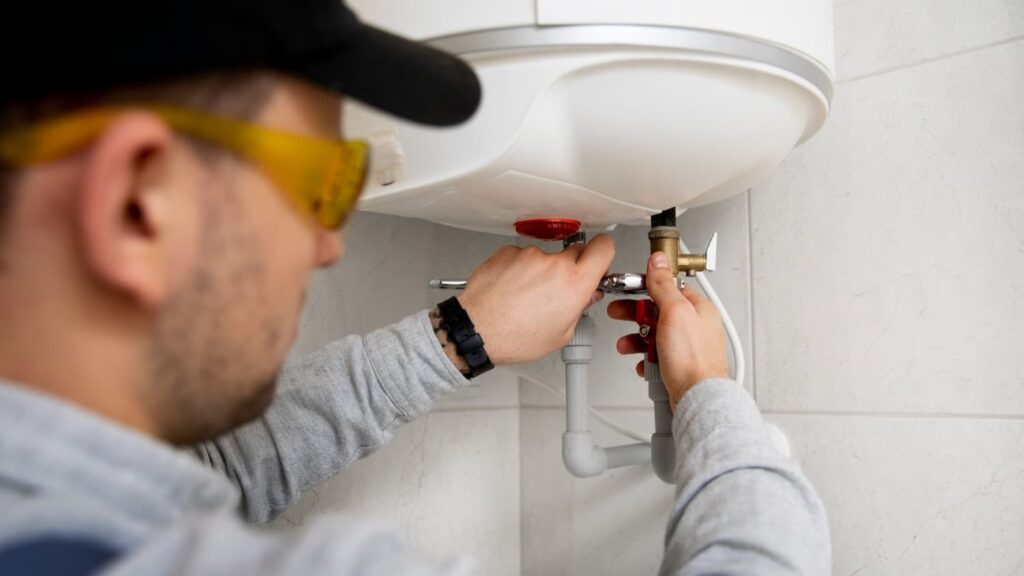Gas Leak: Why It Happens and What to Do
Gas leaks are a serious safety hazard that can lead to devastating consequences if not addressed promptly. From explosions and fires to health complications…

If you’ve spotted water gathering around your hot water heater, you’re probably wondering, “Why is my water heater leaking?” This is a common dilemma for many homeowners, and getting to the bottom of it can save you from bigger headaches down the road. A leak might indicate deeper issues that, if ignored, could cause significant damage.
In this guide, we’ll dive into how hot water heaters function, what steps to take if you find a leak, and tips for preventing leaks in the future.
Hot water heaters are vital appliances that supply hot water for everything from showers to dishwashing. They typically run on either electricity or gas.
Understanding how your hot water heater operates can help you spot problems early, especially when leaks occur. Learn more about the Benefits of Tankless Water Heater for Your Home.
Finding a leak in your hot water heater can be alarming, but knowing how to handle it can make a difference.
First things first—cut off the power to avoid any electrical hazards.
If you’re uneasy about dealing with gas or electricity, it’s best to call in a professional.
Next, stop the water flow to minimize damage.
Taking these actions can significantly lower the chance of extensive water damage in your home.
It’s crucial to figure out if the moisture is from an actual leak or just condensation. If moisture appears evenly across the heater’s surface, it might just be condensation from a hot water heater in a chilly room. Dry the heater and check again for moisture.
Pinpointing the leak source is key for effective repairs.
Knowing the usual culprits of leaks can help you act quickly.
After tackling the immediate leak, it’s smart to look for other potential problems.
When it comes to leaks, deciding whether to repair or replace your water heater is essential.
If you’re unsure about what to do or if the leak persists despite your efforts, don’t hesitate to reach out to a licensed plumber. They can provide a thorough assessment and ensure that your water heater is safe and functioning properly.
If you need expert plumbing services, consider contacting TaskPro. We specialize in water heater repairs and can help you troubleshoot and fix the leak quickly.
If you notice water around your heater, don’t stress. Start by checking if it’s condensation or an actual leak.
Preventing leaks often comes down to proper maintenance.
If your water heater is leaking or you need heating services, don’t hesitate to reach out to TaskPro. We specialize in water heater repair and heating maintenance throughout Surrey, Vancouver, Burnaby, and other areas in British Columbia. Our expert team is ready to troubleshoot and fix your water heater leak. Contact us today to get started on resolving your water heater problems!
Using a leaking water heater can lead to serious issues, like flooding. If ignored, water can damage your floors and walls, resulting in costly repairs.
While a leaking water heater might not always be an emergency, it’s not something to overlook. If you notice water pooling, clean it up promptly to avoid further damage.
Absolutely, leaks can create fire hazards, especially in gas water heaters. Problems like a broken relief valve or corrosion can lead to dangerous situations. Addressing these issues quickly is vital for your home’s safety.
Share this Guide
Gas leaks are a serious safety hazard that can lead to devastating consequences if not addressed promptly. From explosions and fires to health complications…
Septic tanks are a vital component of wastewater management systems, particularly in areas where municipal sewer systems are unavailable. These underground structures treat and…
Choosing the right toilet for your home is more than a simple decision; it’s an investment in comfort, efficiency, and functionality. The type of…